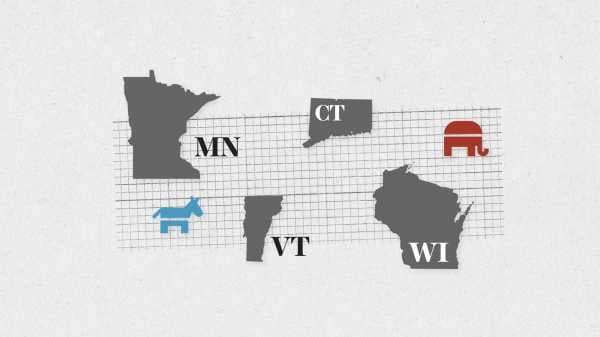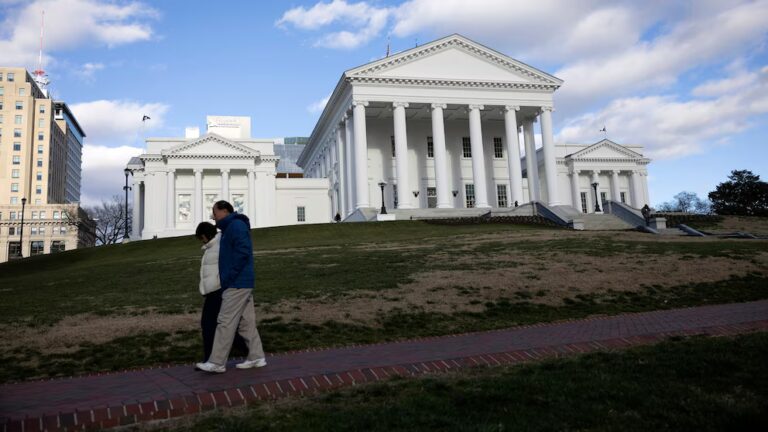
Voters across the country will pick the candidates for some of November’s most contested House, Senate, and governor’s races in Tuesday’s primary elections in Wisconsin, Minnesota, Connecticut, and Vermont.
Wisconsin Democrats will select the nominee they hope can finally take down Republican Gov. Scott Walker, as they get their fourth shot in 10 years to unseat him. Minnesota has a wide-open governor’s race and some House districts that both Democrats and Republicans think they could win from the other party in the 2018 midterm elections.
In deep-blue Connecticut, Republicans still might have a chance to win the governor’s mansion with a deeply unpopular outgoing Democratic governor. The Democrats hope they could turn the tables in Vermont, though Republican Gov. Phil Scott has enjoyed a healthy level of popularity over his first term.
Polls start to close at 7 pm ET. Vox will have live results for all the big races, powered by Decision Desk.
Wisconsin governor: Democrats have another shot at Scott Walker
Gov. Scott Walker is up for reelection again, and Democrats are hoping 2018 is the year they can finally kick him out of the governor’s mansion.
More than eight Democrats have filed to run in Wisconsin’s gubernatorial primary.
Tony Evers, the state’s public education chief, is in the lead, but polling has been scarce, and several other candidates have pulled in notable endorsements and fundraising. Mahlon Mitchell, the president of the Professional Fire Fighters Association, has the support of California Sen. Kamala Harris, and Kelda Helen Roys, a former state Assembly member, has the backing of New York’s Sen. Kirsten Gillibrand (and Wisconsin’s most famed indie band, Bon Iver). State Sen. Kathleen Vinehout (who has run in a Democratic gubernatorial primary before) and political activist Mike McCabe have also gotten progressive support.
Walker will be a formidable challenge, having won three elections in eight years in Wisconsin. But his failed 2016 presidential campaign tanked his popularity in the state, something he has been campaigning hard to fix. Polls show him in a tighter race this year with his Democratic challengers than in any of his past races.
Wisconsin Senate: a bitter Republican primary to oust a red-state Democrat
Sen. Tammy Baldwin is up for her first reelection, and Republicans are gunning for her seat. But a bitter Republican primary risks leaving the party bruised for the general election. The race is between state Sen. Leah Vukmir and former veteran/ex-Democrat Kevin Nicholson.
The Republicans have pushed each other to the right and embraced President Trump. Nicholson’s history as a Democrat and Vukmir’s initial resistance to embrace Trump in 2016 have been used against them.
Baldwin was supposed to be vulnerable, as a relatively low-profile Democrat in a state that voted for Trump. But early polling has shown her ahead of both Vukmir and Nicholson by 10 points or more — and it doesn’t help that Republicans have spent months beating up on their own.
Wisconsin’s First Congressional District: Democrats really want to take Paul Ryan’s seat
Paul Ryan is retiring, and Democrats think they can flip his congressional district blue.
Two candidates — Randy Bryce, a populist ironworker and union organizer who goes by the nickname “Ironstache”; and Cathy Myers, a school board member and teacher — are in a bitter battle for the chance to win Ryan’s seat in Congress.
Bryce gained a national platform after releasing a viral campaign ad in the summer of 2017, raking in donations and winning some high-profile endorsements, like that of Sen. Bernie Sanders.
But he’s had media flubs and faced questions over past arrests for marijuana use and a DUI, and his past failures to pay child support. Myers, who has won elected office in the area, has been actively attacking Bryce’s character and his lack of policy chops. It’s made for an ugly race — and one that could damage both candidates for the general.
The Republican primary looks much more straightforward. Bryan Steil, a well-known local business executive with Ryan’s endorsement, is the favorite to win the Republican nomination.
Also on the ballot: Self-described “pro-White Christian American candidate” and alt-right troll Paul Nehlen; Nick Polce, an Army Green Beret and first-time candidate; Jeremy Ryan, a pro-marijuana candidate whose campaign website features him taking bong rips; and Kevin Steen, a Christian business leader who has been endorsed by Pro-Life Wisconsin.
Wisconsin’s Seventh Congressional District: an opening for Democrats in the north
Covering much of northern Wisconsin, this is the half-rural, half-urban kind of district Democrats are eying across the country in 2018. Health care is playing a major role in this race, after incumbent Republican Rep. Sean Duffy voted for the GOP’s deeply unpopular Obamacare repeal bill last year.
Two Democrats — Margaret Engebretson, an attorney, veteran, and former railroad union worker; and Brian Ewert, a doctor at the Marshfield Clinic — are hoping they can unseat him.
Minnesota governor: Democrat Mark Dayton is retiring, leaving an open seat
Minnesota Gov. Mark Dayton is retiring, and there’s a sizable field of candidates lining up to replace him. On the Democratic side, there’s a competitive three-way race between US Rep. Tim Walz, state Rep. Erin Murphy, and state Attorney General Lori Swanson.
Walz and Swanson look like the frontrunners in this race: A July NBC News/Marist poll found 28 percent of Minnesota primary voters favored Swanson, 24 percent supported Walz, and 11 percent backed Murphy, a progressive candidate running on Medicare-for-all.
Walz represents a more conservative part of the state in Congress, and is being forced to reckon with his past stance on guns — one that had earned him an A rating from the National Rifle Association. Swanson is also facing allegations that she had staff in the attorney general’s office do political work for her.
On the Republican side, the race is on between former Gov. Tim Pawlenty and former state Rep. Jeff Johnson, who ran for governor unsuccessfully in 2014.
On the Republican side, Pawlenty has more name recognition and campaign cash than Johnson, reflected in his 19-point polling lead in the NBC News/Marist poll. But the former governor also has some vulnerabilities; notably, his establishment ties (he’s worked as a lobbyist after leaving the governor’s mansion in 2011) and his disavowal of President Trump, which could hurt him with Trump voters in the state.
As for the general election — the nonpartisan Cook Political Report rates this a toss-up, but the NBC poll found Pawlenty trailing all three Democratic contenders.
Minnesota Senate: new Sen. Tina Smith vies for first reelection
Sen. Tina Smith, Minnesota’s the former lieutenant governor whom Dayton appointed to Senate in wake of Al Franken’s resignation after accusations of sexual misconduct, is running again. She’s got some primary competition from former Bush administration official Richard Painter.
Two Republicans are vying for the spot to challenge Smith: State Sen. Karin Housley faces dental technician and first-time candidate Bob Anderson.
The polling so far looks good for Smith and Housley. As for the general election, this race looks to be pretty comfortably Democratic. Cook rates it Likely Democratic. Smith has kept her head down and voted with the Democratic caucus as a freshman senator, and she was already popular in the state before being appointed.
Smith has a 9-point lead in a hypothetical matchup with Housley, according to the latest polling average from RealClearPolitics.
Minnesota attorney general: Keith Ellison allegations hang over primary
There’s a crowded five-person race for attorney general on the Democratic side. The attorney general race is usually pretty sleepy, but this one has been shaken up by allegations that Democratic candidate and US Rep. Keith Ellison (D-MN) abused his ex-girlfriend.
On the Republican side, former state Rep. Doug Wardlow and former state Sen. Robert Lessard are running.
There aren’t many available polls for this race, but the state has only elected a single Republican attorney general since 1955 … so it seems safe to say the eventual Democratic candidate is favored to win.
The big question mark in this race is Ellison, the first Muslim elected to Congress and a progressive firebrand. He’s is easily the most recognizable name in the pack of Democrats, but he could be in trouble in light of new abuse allegations. This weekend, the son of Ellison’s ex-girlfriend wrote a lengthy Facebook post alleging that Ellison had been abusive to the woman. The claims have not been independently verified, and Ellison has denied mistreating her.
Minnesota’s First Congressional District: an open seat Democrats must defend
Iraq War veteran and Obama administration official Dan Feehan is running to replace Tim Walz, who is running for governor. He has widespread support from the state and national party.
But the main primary competition tonight is between two Republicans: former US Treasury Department official Jim Hagedorn and state Sen. Carla Nelson.
The First District is a fairly conservative region of the state that Walz has been able to get reelected in partially because of his moderate stances. Now that he’s departing, it’s not a given that Democrats can replicate his success.
Feehan has the imprimatur of the Democratic Congressional Campaign Committee. He’s running as moderate — in favor of protecting the Affordable Care Act, the state’s farmers, and the military. Hagedorn and Nelson are both running on conservative platforms and embracing Donald Trump.
Minnesota’s Fifth Congressional District: a Muslim woman could replace Ellison
In the race to replace Ellison in this safely Democratic seat, Ilhan Omar sticks out: She could be one of the first Muslim women elected to Congress.
Minnesota’s Seventh Congressional District: Republicans aim to take down a longtime Democratic representative
Longtime Democratic Rep. Collin Peterson (in office since 1991) is again facing a challenge from Republicans. Two are vying to compete against him in November: Air Force veteran David Hughes versus National Guard veteran and business leader Matt Prosch.
This district is a strange amalgamation: rated R+12 and yet still in Cook’s Likely Democratic category. That’s because Peterson has been in the House for a really, really long time.
He was first elected in 1990 and is the longest-serving House member in the Minnesota delegation. Peterson has a record to reflect that; he’s a friend to farmers in a rural district dominated by agriculture and tends to vote more conservative. Hughes already ran against Peterson in 2016 and lost by 5 points.
Minnesota’s Eighth Congressional District: Democrats hope to hold on to Rick Nolan’s seat
Democratic Rep. Rick Nolan is vacating his seat to run for lieutenant governor, opening up a large field of candidates for this open seat.
Five Democrats are competing to win the primary on Tuesday: North Branch Mayor Kirsten Kennedy, state Rep. Jason Metsa, former state Rep. Joe Radinovich, former TV news anchor Michelle Lee, and progressive activist Soren Sorensen.
On the GOP sides, St. Louis County Commissioner Pete Stauber and Duluth school board member Harry Welty are facing off.
The Eighth Congressional District leans conservative. Now that Nolan is leaving, Republicans see a prime opportunity to win back control of a district Cook rates R+4.
There’s a large field of Democrats running to be the nominee, and there isn’t a clear frontrunner so far. The state party hasn’t yet endorsed a candidate, although Metsa is leading the race in campaign cash. Stauber, the GOP frontrunner and a well-known local politician, has out-fundraised all the Democrats so far.
Connecticut governor: an open seat could flip from blue to red
Current Democratic Gov. Dannel Malloy has opted not to pursue reelection, prompting a large pool of Republicans and Democrats to jump into the race. His dismal approval ratings as the state grapples with a sputtering economy aren’t expected to help any potential Democratic successors.
Two business leaders — Bob Stefanowski and David Stemerman — established early leads on the Republican side, but the field has become more level in recent months.
A July poll gave Danbury Mayor Mark Boughton, who also secured the Republican state party endorsement, the edge. Boughton has run for governor before and is leaning into his bipartisan bona fides: He’s currently the Republican leader of a Democratic city.
Business executive Ned Lamont, the winner of the Democratic state party endorsement, is trying to make the case that voters should keep a Democrat in the governor’s mansion. Voters may recognize Lamont’s name from his successful progressive challenge of then-Sen. Joe Lieberman in the state’s 2006 Democratic Senate primary. Lieberman ultimately ran as an independent in the general election, however, and ended up winning that race.
While Democratic candidates have dominated statewide offices in Connecticut as well as several recent presidential elections, historical patterns concerning the governor’s mansion don’t bode well for the party: It tends to switch hands when one party has been in control for a while. Cook Political Report considers this race a toss-up.
Connecticut’s Fifth Congressional District: Esty’s open seat is up for grabs
Rep. Elizabeth Esty is one of few Democrats leaving the House, with retirements less common on the left in 2018. She announced in April that she would not seek reelection after she faced enormous heat for allegedly mishandling accusations of sexual harassment against one of her staffers.
The district — which Clinton won by roughly 4 percentage points in 2016 — is being targeted by Republicans in the wake of Esty’s departure.
Manny Santos, a former mayor of Meriden, has snagged the state Republican Party endorsement. He’s argued that Democratic opposition to President Trump’s policies has contributed to Connecticut’s economic woes. Business executive Rich DuPont and former college professor Ruby Corby O’Neill are also in the running.
Former Simsbury official Mary Glassman earned the state Democratic Party’s endorsement in May. Glassman has also previously run for lieutenant governor and is emphasizing her government experience as a selling point. Educator Jahana Hayes is on the ballot too.
Vermont governor: Vermont governor: Gov. Phill Scott faces challenger, while Dems could make history
While Phil Scott has been a popular governor for his single term in office, his efforts to strengthen gun control have more recently prompted significant backlash among Vermont voters.
The bills he signed in April, after authorities apprehended a teenager allegedly planning a school shooting in Fair Haven, Vermont, raised the age required for gun purchases to 21, enhanced the scope of background checks, and banned bump stocks, while putting limits on gun magazines.
State Sen. John Rodgers, a Democratic write-in candidate, is among those who’ve said he thinks certain provisions of these laws infringe on established constitutional rights.
There’s a crowded field on the Democratic side, include a few candidates who’ve been generating quite a bit of buzz. Ethan Sonneborn, a 14-year-old high school student who wants to see more young people engaged in politics, is among the contenders. (Vermont has no age requirement for candidates.) Christine Hallquist, a former electric co-op executive, is also on the ballot and could be the first openly transgender person nominated for governor by a major party.
Others on the docket include Brenda Siegel, an executive director of the Southern Vermont Dance Festival, and James Ehlers, an environmental activist. A July poll found that Hallquist had the highest name recognition of the plethora of Democratic contenders.
Despite the blowback Scott has faced, the Cook Political Report still rates the race — for now — as Solid Republican.
Sourse: vox.com






